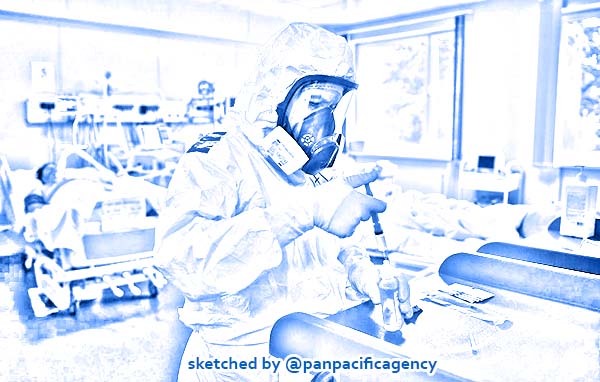India and UK join forces on new £8M research on antibiotic-resistant bacteria

MOSCOW, RUSSIA - JUNE 2, 2020: A nurse in a ward at the RZD Medicine chain's Semashko Hospital for COVID-19 patients in Stavropolskaya Street. Stanislav Krasilnikov/TASS. Sketched by the Pan Pacific Agency.
NEW DELHI, Jul 28, 2020, Hindustan Times. India and Britain will deepen scientific research collaboration with five new projects to tackle anti-microbial resistance (AMR) that could lead to advances in the global fight against antibiotic-resistant bacteria and genes, Hindustan Times reported.
The five projects are planned to start in September once they receive the appropriate clearances. Britain is contributing £4 million from the UK Research and Innovation Fund for International Collaboration, and India will match this with an equal amount. The Indian side will be represented by the department of biotechnology.
The funding awards by the UK were announced by Tariq Ahmad, minister of state for South Asia and the Commonwealth, ahead of a virtual visit to India on Tuesday.
India is a key producer of antimicrobial for the global pharmaceutical supply chain, and the research projects aim to develop a better understanding of how waste from antimicrobial manufacturing could be inadvertently fuelling AMR.
A statement from the British high commission quoted Ahmad as saying: “The UK has already partnered with India’s Serum Institute to manufacture the vaccine for Covid-19, if clinical trials are successful, with plans to distribute to a billion people across the developing world.
“But there is more we can do together to tackle urgent global health issues in the world. Our thriving research and innovation partnerships will benefit people in the UK and India, and beyond.”
British high commissioner Philip Barton said the UK is India’s second biggest research partner, with joint projects expected to be worth £400 million by 2021. “This huge investment enables us to work closely together on global health challenges such as the search for a Covid-19 vaccine,” he said.
During the virtual visit to India, Ahmad will chair a roundtable via video conference with Indian and UK-based stakeholders on cold chain technologies that are critical for the transport of vaccines.
He will also have a virtual meeting with minister of state for external affairs V Muraleedharan to discuss a range of issues, including multilateral cooperation, and a virtual meeting with Gujarat chief minister Vijay Rupani. There will also be discussions with regional governments and others on opportunities in wind power.
Among the five projects to tackle AMR is SELECTAR, which involves representatives from the University of Birmingham, Aligarh Muslim University, Panjab University, CSIR-Central Drug Research Institute, Indian Institute of Technology and Jamia Millia Islamia University investigating the impact of waste release on microbial ecosystems.
The Advanced Metagenomics, Sensors and Photocatalysis for Antimicrobial Resistance Elimination (AMSPARE) proposal brings together experts on sensor technologies, water treatment and remediation from India with experts on policy and industrial regulatory processes from the UK to research AMR proliferation in the environment.
Another project involving experts from Puducherry and Chennai and the Imperial College London relates to advancement of knowledge for addressing antimicrobial resistance in the environment. Experiments, mathematical modelling and risk analysis by representatives from Birmingham University, Indian Institute of Technology-Hyderabad and Indian Institute Technology-Gandhinagar will contribute to risk assessment and setting evidence-based environmental standards.
Representatives from the University of Warwick, PGIMER, CSIR-NEERI, Aligarh Muslim University, Indian Institute of Technology-Delhi and Banaras Hindu University will come together to inform policymakers and industry experts and managers on the impact of inappropriate waste disposal.